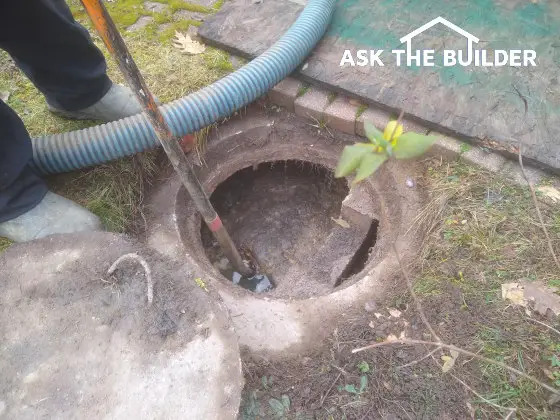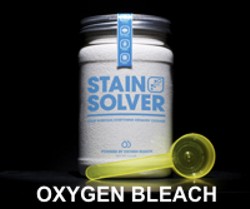Septic Tank Cleaning

Septic Tank Cleaning | This is my septic tank about to be pumped. It’s a best practice to do this every two or three years. Copyright 2021 Tim Carter
Septic Tank Cleaning - Do it Every 2 or 3 Years
DEAR TIM: I just moved from the city to the country and was informed by a neighbor that septic cleaning should be added to my list of things to do. I’ve never had a septic tank and now am concerned about how to care for it and how often I should clean my septic tank. Is this something I can do? What’s involved in septic system cleaning? How can I extend the life of my septic system? Ruth T., Douglasville, GA
DEAR RUTH: I’m also the proud owner of a septic tank and system for the first time in 56 years. I grew up in the city and all the houses I lived in were connected to the city sewers. My attitude while living in those houses, although it’s wrong, was that if it flushes down the toilet or passes through a drain line all is well. You shouldn’t do that with any plumbing system, and it’s especially detrimental to a septic system.

This bare spot of ground is a clue that a warm septic tank is just below the surface. That warmth promotes biologic activity in the tank. PHOTO CREDIT: Tim Carter
Who Should Clean a Septic Tank?
A professional septic tank pumping company is the only one that should attempt to clean a septic tank.
CLICK or TAP HERE to get FREE BIDS from local septic tank pumping companies.
Septic tank cleaning and pumping should never be attempted by a non-professional. It’s dangerous work, and you can expose yourself to dangerous pathogens that thrive in the septic system. Never stick your head in the void space of a septic system as the decomposition of the waste material generates methane and other gases that push out oxygen from the system. You can pass out and die if you try to peer deep inside the tank.
What Equipment is Used to Clean a Septic Tank?
When you call a professional, they almost always come to your home with a large tank truck. The truck is equipped with a suction pump and a large flexible hose. Think of it as the largest wet-dry vacuum you’ve ever seen. This truck sucks the liquid and solids out of your tank so that your septic system works better.
Does Cleaning a Tank Help the Leach Field?
Septic tank cleaning helps prolong the life of your leach field. The leach field is an important part of a septic system that usually consists of piping surrounded by washed gravel or coarse sand. Partially treated water exits the septic tank and flows into the leach field to be purified by bacteria in the soil.
How Big Should a Septic Tank Be?
A septic tank needs to be sized according to how much average waste it receives each day. Typically it's sized by the number of bedrooms in a house.
For a septic system to work properly, it needs to have a significant volume of liquid space in the tank so the waste that’s dumped into the tank can start to break down. However, if the tank starts to fill with solids like sand, silt, gravel and any other solid objects that displace water, there is less liquid in the tank. What’s more, the tank needs to be regularly cleaned of scum, grease, and any other material that floats on the surface of the liquid in the tank.
It's best to do regular maintenance of the drain lines in your home too to help prevent clogs that could harm the septic tank.
How Often Should a Septic Tank Be Cleaned?
The cleaning schedule depends upon how heavily the septic tank is used, what’s put in it, if it was originally sized correctly for the size of the house, etc. There is no set schedule that works for everyone and every tank. I suggest that you call several septic system cleaning companies to see if they will come out and give you an evaluation of how your system is now. It’s well worth the money. If you wait too long, you can permanently harm your leach field. Those are very expensive to replace.
What Should Be Put in a Septic Tank?
In a perfect world, the only thing that should enter a septic tank should be what comes out of your body and tiny food scraps that make it through the tiny holes in a kitchen sink strainer.
To extend the life of your septic system, you need to clean it regularly, and then watch what you put into the tank in between cleanings. Obviously human waste is fine to put into the tank as well as anything you might put into your mouth to eat or drink. Anything else is pretty much a no-no.
Should Chlorine Bleach Be Put in a Septic Tank?
Avoid putting in chlorine bleach into your septic tank. Chlorine bleach can be added directly from bottles, but it’s also usually found in cleaners and soaps. Chlorine bleach can kill the beneficial bacteria in the tank that does the heavy lifting of breaking up solid waste in the tank. However, you should consider adding oxygen bleach to the septic tank as the oxygen increases the bacterial activity inside the tank.
Should I Put Grease, Paint, and Chemicals in a Septic Tank?
Do not add grease, paint, chemicals of any nature, etc. to the tank. Rinse heavily soiled and dirty clothes in a bucket and pour the muddy, sandy water outdoors. Remember, muddy clothes contain solid silt particles that can cause problems in the tank and leach field if they get that far.
What is a Great Source of Septic Tank Information?
The Small Flows Clearing House is a great place to get more information about septic tank design and maintenance.
Talk to different septic system cleaning professionals and they might tell you different things about the care of your system. One of the leading independent organizations that has really done lots of research on septic systems is the National Small Flows Clearinghouse (http://www.nesc.wvu.edu/wastewater.cfm) that’s associated with West Virginia University. They have an abundant amount of free information that will help you maintain your septic system.
Will Latex Paint Harm a Septic Tank?
Latex paint is especially sinister to a septic system and can wreak havoc in the leach field. NEVER clean paint brushes in a sink and allow that water to flow into your septic tank. Never clean any chemicals of any sort in sinks allowing the water to enter the tank. The rule I use is that if I can’t eat or drink it, it doesn’t go into the sink drain or toilet. Follow that simple rule, clean your tank regularly and all will be well.
Column 815
